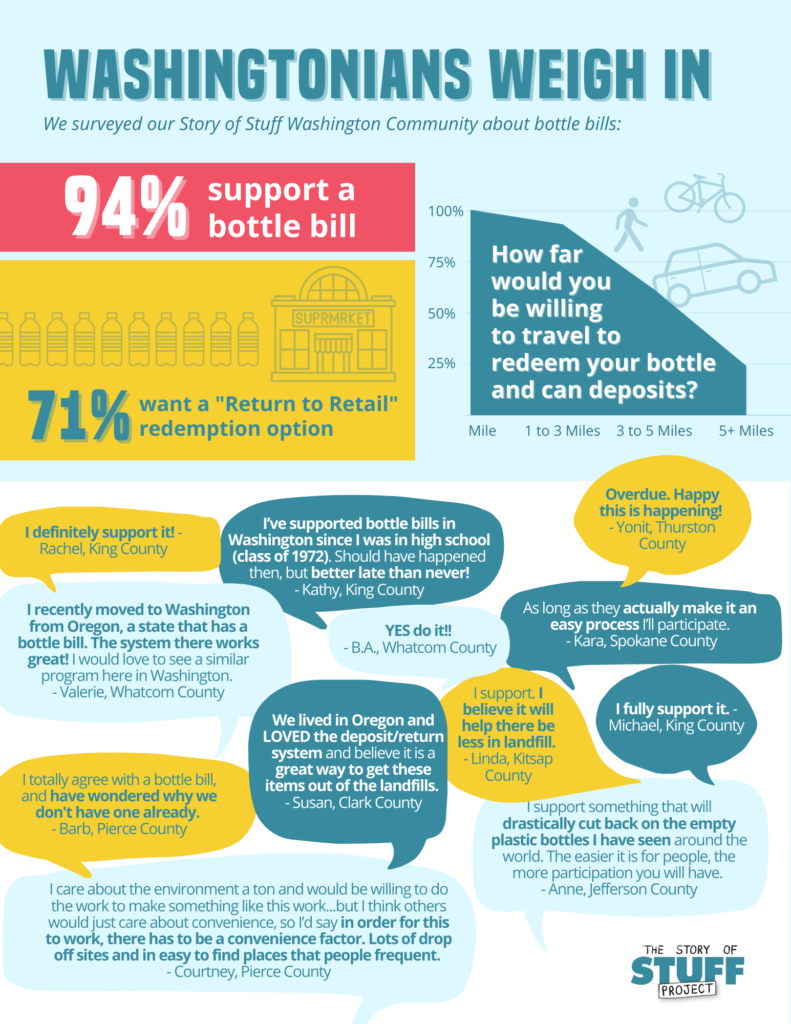Washington State could become the eleventh state in the nation to enact a ‘bottle bill’ by including a small deposit on bottles and cans to incentivize their return for recycling and reuse. We polled more than 130 members of the Story of Stuff Community to get their take and see what’s important to them.
The poll included three primary questions:
- Would you support a bottle bill in Washington state?
- How would you prefer to redeem your deposit?
- How far would you be willing to travel to get back your deposits?

Huge Support for a Bottle Bill, With a Catch
The main takeaway is that there is an overwhelming 94% approval rating for a deposit return system among our Community. In addition to the high levels of support, numerous respondents shared their familiarity with the system from other states or expressed support for the impact that such a program would have in reducing plastic pollution and waste.
That said when asked, Washington residents expressed that convenience was key to their participation in the system. 71% of respondents want to have a ‘return to retail’ option, and to be able to redeem their deposit wherever they do their grocery shopping. 45% wanted recycling centers as an option, and 44% wanted bag drops. On the question of distance, 100% of respondents expressed willingness to return bottles and cans by traveling 1 mile or less, versus just 25% participation if that required a trip of 5 miles or more.
We chose these questions since convenience is a key part of what distinguishes highly successful deposit return programs. Our Community’s response reflects why: if the system is designed around the needs of residents, they work optimally. While Washington’s bottle bill has a number of strengths, convenience standards are currently lacking in the system design – this is a key area for improvement.
Currently, the legislation HB 1131 / SB 5154 is set to be wholly reliant on a ‘bag drop’ system where you store empty containers in bags and drop them off at a depot, where an online account is credited with funds after the drop-off. While this system has a number of benefits, complete reliance on it has drawbacks including – a wait period to receive refunds, it requires an additional trip to return bottles and cans (rather than returning in-store), it involves using more plastic and can produce accessibility challenges.
Washington’s ‘WRAP ACT’ Legislation
In January, Senator Christine Rolfes and Representative Liz Berry introduced the WRAP Act which includes a bottle bill, producer responsibility (polluter pays) model for other packaging materials and recycled content requirement for packaging sold in the state.
We are particularly enthusiastic about the deposit return system which has a proven track record for reducing ocean-bound plastic as well as creating the blueprint for a scalable model for reusable beverage containers. For reference when Oregon introduced its bottle bill, it reduced littered bottles and cans by 83% and all litter by 47%.
While the bill would have a significant impact in reducing litter, improving recycling and reducing demand for raw materials, the system creates the infrastructure for a major transition to refillable bottles at scale; Washington could be the first state to establish a statewide refillable program including targets. While the bill currently requires 1% of beverage containers to be sold in refillable containers, this is just a starting point and it could serve as a launchpad for much higher targets in the coming years.
Contact
If you are a Washington resident that would like to get more involved in supporting a strong bottle bill contact Alex Choy: Alex[@] Storyofstuff.org for more information.
